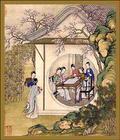2) dowry;marriage portion;trousseau


妆奁; 嫁妆
3) make-up
[英]['meɪk,ʌp] [美]['mek,ʌp]


化妆
1.
The author in this paper, based on her own observation, finds that Beijing Opera, in its performance stylization, costume design and make-up, demonstrates a lot of evidence to prove the classical metonymical theory advanced by the western scholars.
文章旨在说明中国京剧在表演程式和化妆服饰这些舞台语言上表现出的写意性特征,与西方转喻理论有很多相通之处。
4) Dowry
[英]['daʊri] [美]['daurɪ]


嫁妆
1.
The Entanglement between"Cai"(Property) and"De"(Virtue):The Focal Point and Tendency of the Research on Chinese Women's Dowry in America Academic Circle
“财”与“德”的纠葛——近年美国学界关于中国妇女嫁妆研究的焦点与趋向
2.
Relative to a set of analytical conceptions of wealth and consumption goods and relative to an understanding of the cross-culturaUy recognizable differences among payments,gifts,bequests and inheritances,this paper is a constructive critique of the well-known book by Jack Goody and Stanley Tambiah (1973),Bridewealth and Dowry.
杰克·古迪(Jack Goody)和斯坦利·坦比亚(Stanley Tambiah)的名著《聘礼与嫁妆》,其框架有助于提出分析婚姻及相关社会经济过程的新的基本理论概念。
3.
Based on the investigation in a village in south of Shandong province, the article shows that whether the parents donate the doctor dowry or not and how much the dowry is worth, are not a simple economic issue.
本文以山东南部一个村落的田野资料为基础,表明嫁妆的有无与价值的多少并非一个单纯的经济问题,它与女子在接受妻子集团的生活、与两个联姻家族之间的姻亲关系息息相关。
5) unique make-up


奇妆
6) dressing case


妆具
补充资料:玉楼春·晚妆初了

玉楼春·晚妆初了
晚妆初了明肌雪,
春殿嫔娥鱼贯列。
笙箫吹断水云开,
重按霓裳歌遍彻。
临风谁更飘香屑,
醉拍阑干情味切。
归时休放烛花红,
待踏马蹄清夜月。
【作者】:李煜 【朝代】:唐 【体裁】:词
【格律】:
○平声 ●仄声 ⊙可平可仄 △平韵 ▲仄韵
晚妆初了明肌雪,
●○○○○○●
春殿嫔娥鱼贯列。
○●○○○●▲
笙箫吹断水云开,
○○⊙●●○○
重按霓裳歌遍彻。
○●⊙○○●▲
临风谁更飘香屑,
⊙○○⊙○○●
醉拍阑干情味切。
●⊙○⊙○●▲
归时休放烛花红,
○○○●●○○
待踏马蹄清夜月。
●●●○○●▲
==描写==:
月圆之夜,大型宫廷歌舞酒宴。出场前先是画妆。因是晚妆,为了适合舞场与烛光,画眉点唇,都不妨色泽浓艳。宫娥们刚画完妆的一刻,是何等光彩照人呀!妆毕,春殿上美女如云,她们队列整齐,鱼贯而入,虽是层层娇娘的行列,望之也顿生军旅的浩荡之感。
歌罢宴散,月色更明。当即吩咐随从灭尽红烛,纯任得得马蹄,踏着一路月色归去,方见得歌舞虽散,而余兴未尽!
说明:补充资料仅用于学习参考,请勿用于其它任何用途。